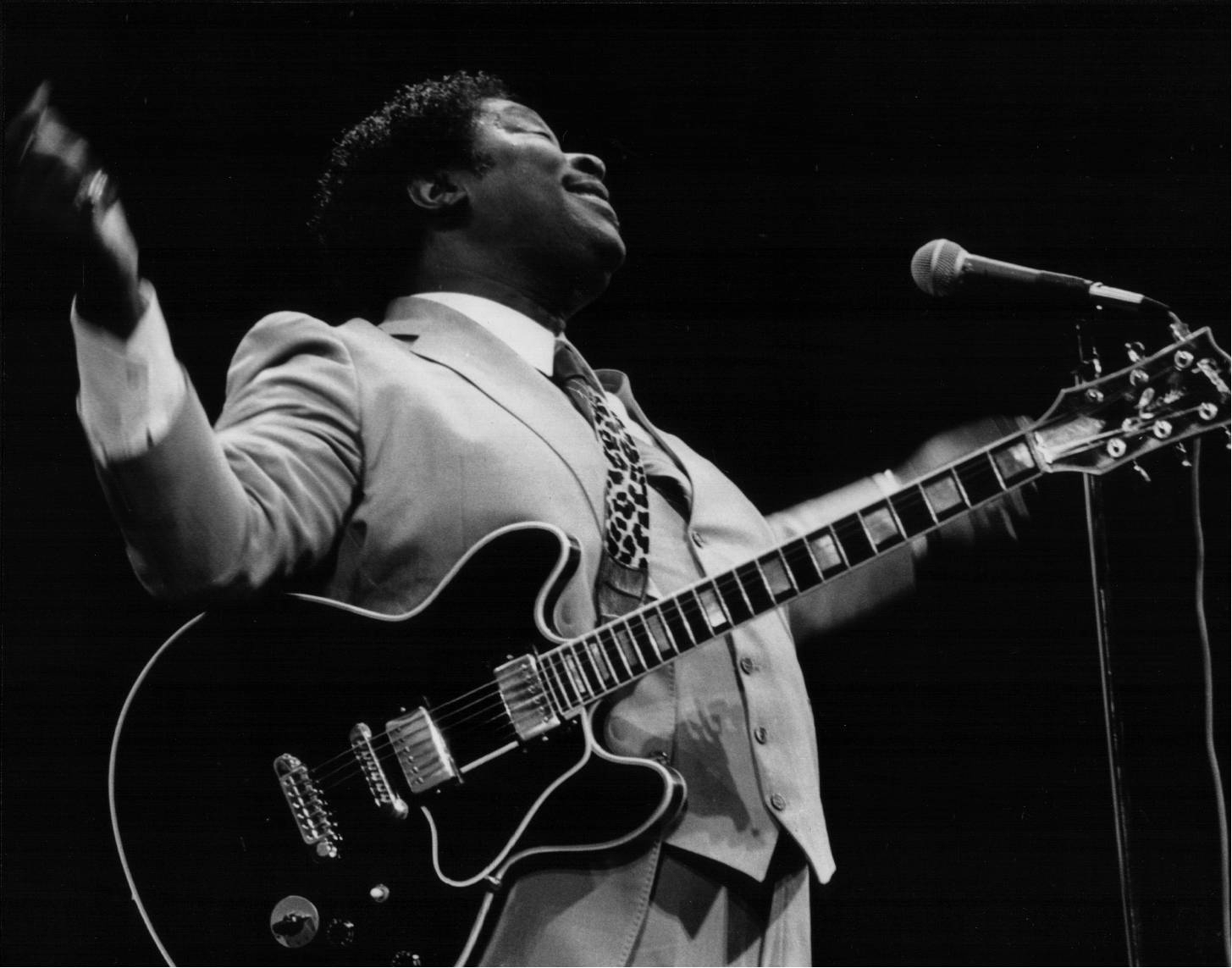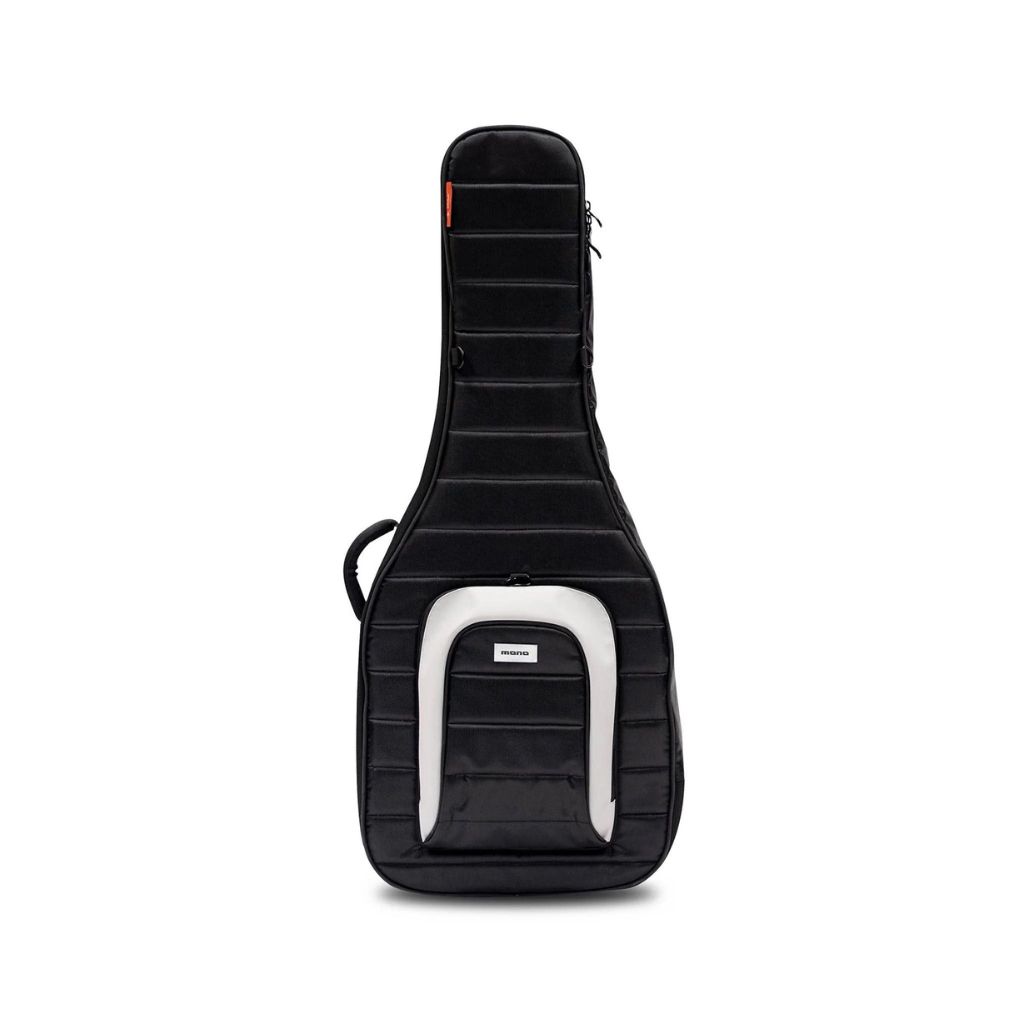BB King 1925-2015: a life in music celebrated
For the past three decades, Bob Hewitt has interviewed and photographed some of the world’s greatest musicians, as well as producing two films on the history of the Fender guitar. Here, with input from the likes of Billy Gibbons, Kenny Wayne Shepherd and Andy Fairweather Low, Bob reflects on the incredible life and legacy of BB King, a musical icon.

BB King live circa 1985. Image: Bob Hewitt
The King is dead… long live The King – and the wonderful catalogue of music he leaves behind for us to enjoy. BB King passed away in his sleep on 14 May at his Las Vegas home, aged 89 years. He was known as ‘The King of the Blues’ – a man who could make your spine tingle with just one note – rather than a blizzard of distortion and fast fret wizardry. Tributes have flooded in from all over the world, for a man whose music touched so many people all over the planet.
I spoke with Kenny Wayne Shepherd, whom King nurtured during his teenage years; he told me “BB is a tremendous loss to the world – not just to me on a personal level. I’m grateful, for the rest of my life, for the time I got to spend with him.”
Speaking the day after BB’s death, Billy Gibbons said: “It’s difficult to fathom a world without BB King. He’s been with me literally since the dawn of my musical consciousness.”
Born into the blues
Music was born into Riley B King as he entered this world on 16 September, 1925 on the banks of Blue Lake, close to Indianola. He grew up with the influence of guitar-playing preacher Rev. Archie Fair and BB’s bluesman cousin Bukka White, and his playing was further enhanced by the tones of Charlie Christian, Lonnie Johnson, Django Reinhardt – and especially T-Bone Walker. Any showmanship and ‘pizzazz’ would come from his love of the great Louis Jordan.
At an early age, he escaped a ‘career’ of driving a tractor on the plantation and headed for Memphis to forge a future in the music business. Success came his way, firstly as a DJ with station WDIA, fronting a show – and performing a jingle promoting Pepticon – a type of ‘snake oil’ tonic, said to cure all ills. He quickly acquired the moniker ‘Beale Street Blues Boy’ – which was later transposed to the ‘BB’ we are all familiar with today.
His singing and guitar-playing skills led him into his first band – and he didn’t look back. Soon, the ‘Beale Street Blues Boy’ would be recording – and touring the American circuit in his own custom bus, the bodywork emblazoned with the words ‘BB King’. This was the start of something big; something that would last for more than 60 years.
The hits started to roll… Three O’Clock Blues, Everyday I Have The Blues, Sweet Little Angel, Rock Me Baby – and the show-stopping The Thrill is Gone. There were collaboration hits, too – When Love Comes To Town with U2 and the album title track Riding With The King, performed with long-term friend Eric Clapton.
Following news of BB’s death, Eric said: “BB King was THE ORIGINATOR – the rest of us just copy – listen to Live At The Regal… it’s all there.”
Guitar man
The famous ‘Lucille’ – a name given to all of King’s guitars, came about following a fire at a gig in Twist, Arkansas. A fight ensued – and a stove set the building alight. BB fled the building – but realised he’d left his little black Gibson acoustic inside. He later found out the fight was over a girl named Lucille, and all future guitars would bare that name on the headstock.
Other than that little acoustic with a DeArmond pickup attached – and his name paint-brushed on the body – BB was one of the first guitar players to use a Fender Esquire. But it’s the Gibson ES-355 that has become synonymous with the great man.
Andy Fairweather Low, who has played with King and Clapton on many occasions, said: “I have played the same [Gibson ES-355] type of guitar as BB King – so have a million other players. But only one person speaks with that ‘voice’ – only one so clear and definitive. It’s not about ability as such – it’s about soul… direct from your heart to your fingers.”
BB King let his guitar speak like the human voice – rarely playing chords, but rather a tasteful selection of carefully chosen notes, that rang clear and true from his amplifier of choice – the Fender Twin Reverb.
Alan Rogan – guitar tech to the stars – told Guitar & Bass: “BB King was wonderful to work with, I will miss him – a real gent.”
Alan helped BB both in the studio and at his Royal Albert Hall gigs: “BB used my old tweed high-power Fender Twins – he said they were the best amps he’d heard in 35 years!”
Of course, it wasn’t just BB’s unique guitar style that propelled him to stardom – he had a powerful but melodic and beautiful singing voice. Speaking to Guitar & Bass just hours after King’s death, Daryl Hall – another King collaborator – cited BB’s ‘soulfulness’.
“Ten years ago, I performed a duet with BB called Ain’t Nobody Home, and I was totally impressed with his singing at the age of 80. Not only was BB a great bluesman, he was a great soul singer – and he will be very missed”.
Uncle B
BB opened his own blues clubs throughout the USA and he was inducted into the Blues Foundation Hall of Fame as well as the Rock & Roll Hall of Fame.
Legendary record producer and guitarist John Porter worked with BB King for many years – both on sessions and in the studio. He was responsible for the acclaimed Deuces Wild and Grammy-winning Blues On The Bayou albums. We caught up with John at his Wiltshire home to talk about the sad news.
“I knew him as ‘Uncle B’,” said John. “We played on a lot of sessions together, but importantly, we talked a lot too… about blues and road stories. BB was a real gentleman in every sense of the word – gracious and kind. My whole life was changed by him,” said Porter.
When asked about The King’s music, John said: “Musically, he re-wrote the book for electric blues guitar playing – you can’t hear music today without his influence.” John also spoke of BB’s love of Peter Green, a player who he said “really got me excited.”
“You can hear BB’s style and influence in today’s ‘blues youngsters’ – especially Kenny Wayne Shepherd,” said John.
Kenny spoke to Guitar & Bass from California about the passing of his mentor and close friend: “I grew up listening to BB via my dad – his music was the soundtrack of my childhood,” he said. “I toured with him when I was 15 years old – and on my 16th birthday, he sat me down for a ‘man to man’ chat – gave me lots of ‘fatherly advice’… especially about my responsibility as a musician.”
Although KWS can rock out with the best of them, you can hear BB’s influence throughout his guitar playing. “His spirit is very much alive in my playing,” said Kenny. “He taught me the power of one note – or just a few choice notes, delivered at the right time… say more with so much less.”
Mark Flanagan, guitarist in Jools Holland’s Rhythm & Blues Orchestra, also recalls learning a valuable lesson while playing with The King: “I don’t remember him looking once at his amplifier. It was probably a Twin from John Henry’s… He just plugged in, tweaked the old ES-355 – he used a surprisingly high action, buy the way – and it sounded like him!
“A lesson for those gear-heads out there: sound isn’t just about equipment, it comes from your hands, your head and your heart, and BB had a bigger heart than most. What a player. What a man. What a legacy. Thank you Mr King.”
King’s influence is felt from famous players such as Kenny Wayne to the ‘unknown’ upcoming young stars of the future. Max Jenks-Gilbert is a 19-year-old British guitarist based in South Carolina – sitting in with Ezra Brown and his band. To hear him laying down his BB chops on his Epiphone Casino, is like listening to ‘The Master’ live at The Regal.
“BB King was the main reason I started playing the blues,” said Max. “He’s possibly the biggest influence on my guitar playing today – showing how three simple notes can say more than anything else.” Max concludes: “BB King will forever remain ‘simplicity for the soul’ – and his music will continue to inspire generations to come.”
To know him was to love him
This writer was fortunate and privileged to work with BB – and his [then] manager Sid Seidenberg, photographing his British tours during the 1980s. There was one particular image that was a favourite of Sid’s and BB’s [see above].
Waiting side-stage at a Manchester theatre while his band played his intro, BB was telling me how much he liked that particular photo. He turned to me and said: “You play guitar don’t you son? I’d like to give you a ‘Lucille’ of your own.”
I was so shocked, I almost fell over – “Yes, I do Mr King, thank you so much,” I stuttered. I couldn’t believe the ‘King of the Blues’ was going to gift me one of his Gibson guitars! BB turned around, took off the little gold 355 shaped lapel pin he was wearing – and stuck it onto my jacket. “There you go – now you’ve got a ‘Lucille’ too”!
That was 30 years ago and I still have that treasured pin to this day.
BB King’s music and humility touched everyone – young and old. Some will say “The Thrill is Gone” now BB is no longer with us – but I disagree, I think ‘The Thrill’ will be around for many years to come.
I’ll leave the final words to BB King’s favourite protégé, Kenny Wayne Shepherd: “We had 89 years of one of the greatest human beings on this planet – he gave us so much incredible music. We should appreciate and celebrate his life.”
Amen to that.

